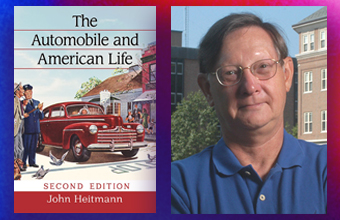College of Arts and Sciences Newsroom

Greenlighted
University of Dayton Professor John Heitmann is a noted expert on the two-way relationship between automobiles and the people who drive them.
In August, Heitmann released the second edition of his book, The Automobile and American Life. Originally published in 2009, and with more than 1,100 copies in libraries world-wide, the book focuses on the history of the automobile and its development as one of the most influential technologies of the 20th century.
The latest installment includes a new chapter that provides further discussion on the technologically and economical changes within the automotive industry during the 1970s.
“There were some aspects of the ’70s listed in the first edition, but the ’70s really marks a terrific transition in the automobile industry both in the United States and globally,” said Heitmann, a professor of history. “I really needed to bring that material out with this second edition.”
Heitmann’s first edition was published amid the Great Recession, which had a significant impact on the automotive industry. New car sales plummeted 21 percent in 2008 and 2009, according to Ward’s Motor Vehicle Data. This decline of domestic car sales is detailed in his latest installment.
“The Great Recession is part of a really complex period of time,” Heitmann said. “I think it’s fair to say that government intervention saved the American auto industry. Now it’s thriving again, but product mixes are changing, among other things.”
Heitmann’s other contributions to the study of automobile history include Stealing Cars: Technology and Society from the Model T to the Gran Torino, written with Rebecca Morales and published in 2014. That book examines the history of motor vehicle theft.
Heitmann is a frequently sought expert to discuss automobile history. Since 2009, he has made appearances on ABC News Tonight and CNN International, among other media outlets. In August, he was quoted in a Wall Street Journal article about declining U.S. manufacturing of the sedan.
What makes Heitmann’s work so significant to the field of automotive history is his ability to explain how man influences the machine, and how the machine influences human beings.
"While Dr. Heitmann's recent work is centered on automobiles and technology, it's the humanity of those that use the technology and the interaction between humans and machines that interest him most,” said Juan Santamarina, associate professor and Department of History chair. “Within the field of automotive history his work is so valuable because of his focus on people and humanity."
While restoring his 1971 Porsche 911T Targa, Heitmann continues his research on the history of driver education and automotive racing trends from 1911 to 1921, which he refers to as “the golden age” of racing.
Heitmann, who holds a doctoral degree in the history of science from John Hopkins University, joined the University of Dayton faculty in 1984.
"An extremely active scholar and teacher, a perennially curious mind, and mentor to many, Dr. Heitmann's career has been an exemplary model for teachers and students alike,” Santamarina said.
The second edition of The Automobile and American Life is available for purchase online and in select bookstores. For more information, please visit the publisher’s website.
- Griffin Quinn ‘21
